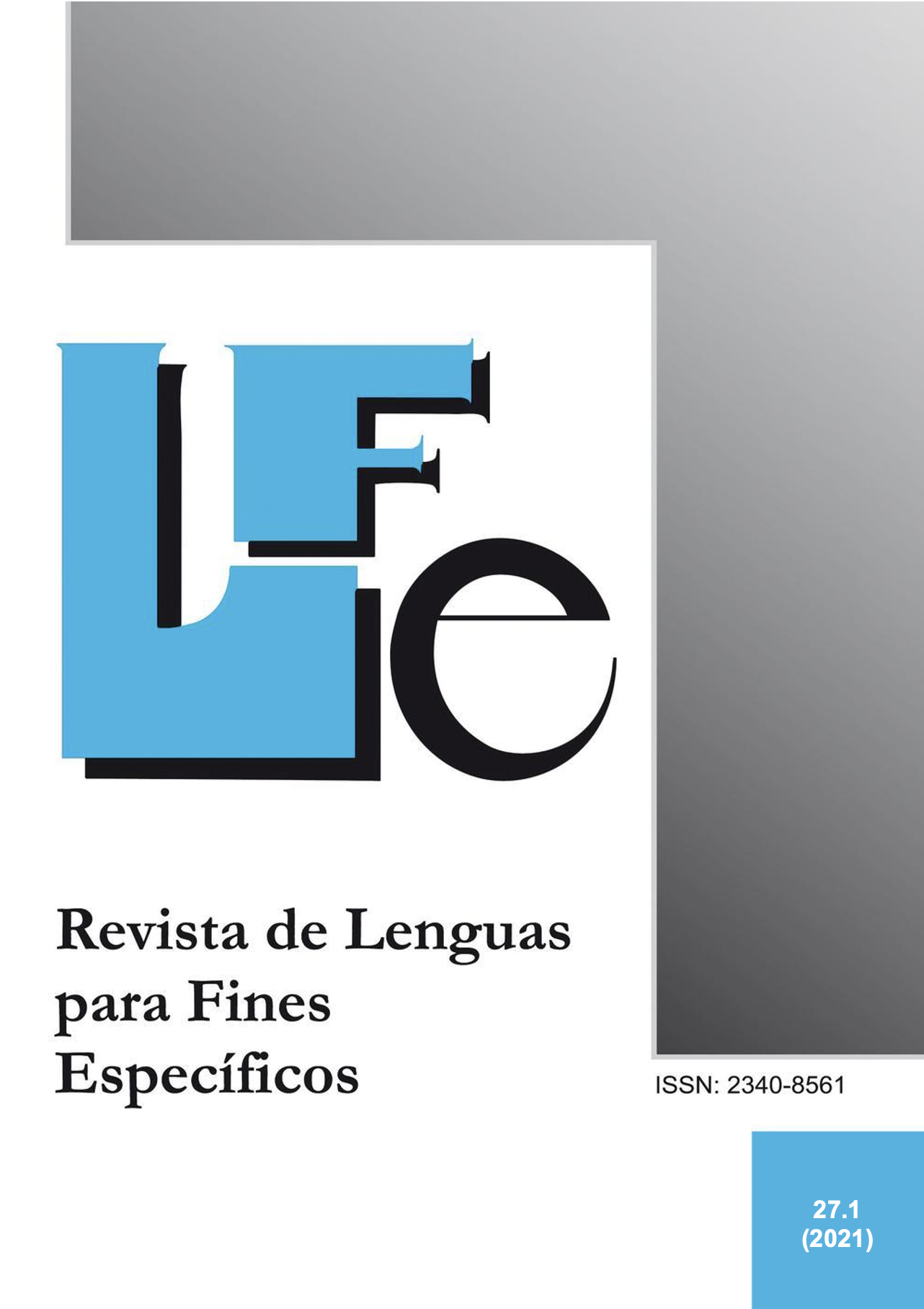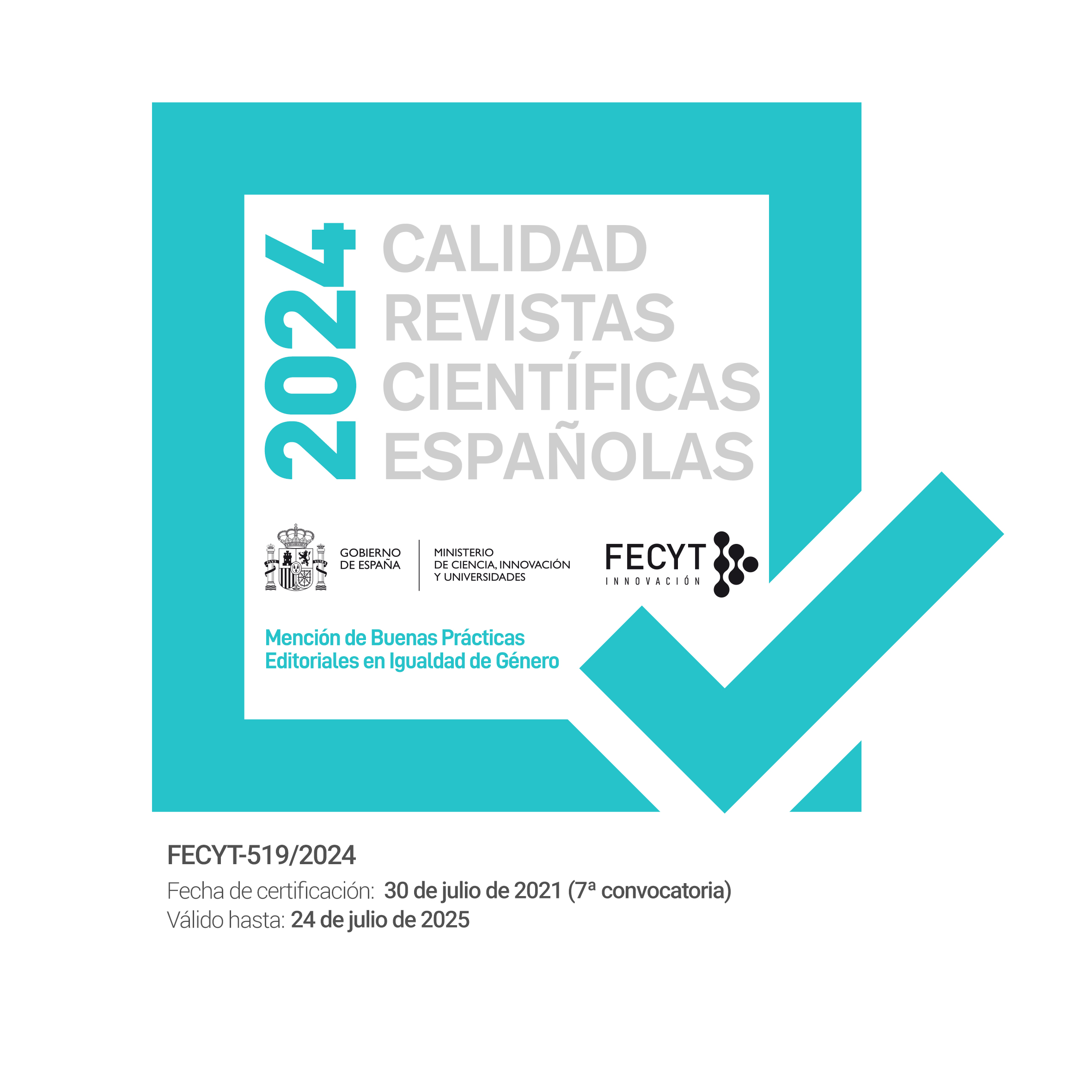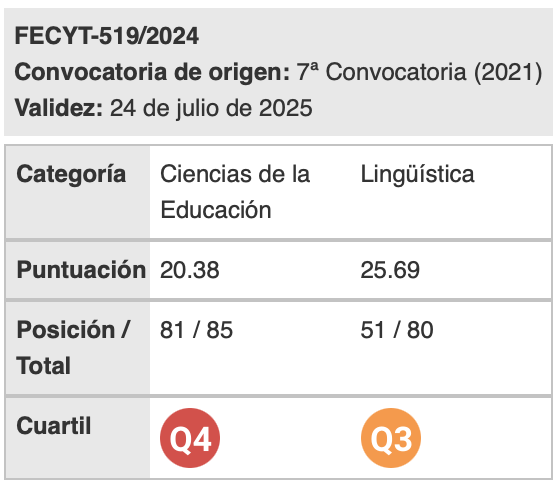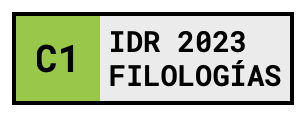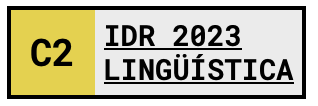Un análisis crítico del uso de pasivas y cláusulas de relativo en los artículos de investigación en Freshwater Ecology
Palabras clave:
pasivas, subordinadas, Inglés con Fines Académicos, artículos de investigaciónResumen
En el marco de los estudios comparativos, este artículo analiza el uso de pasivas y subordinadas en artículos de investigación sobre ecología de agua dulce. En un corpus de 20 artículos, se llevó a cabo un análisis crítico con el fin de resaltar las diferencias existentes entre autores nativos y no nativos anglófonos, escritores y escritoras, períodos de tiempo y categorías de revistas. Los resultados revelaron que los autores no nativos anglófonos hacen un mayor uso de las estructuras pasivas y subordinadas. Sin embargo, solo se encontraron diferencias de género en el uso de subordinadas, siendo más empleadas por las escritoras que por los escritores. Las diferencias temporales son consistentes con investigaciones previas que notaron un cambio hacia un discurso menos formal en la escritura científica. Desde un punto de vista didáctico, se espera que los hallazgos de este estudio amplíen el conocimiento de las variaciones existentes en la escritura científica para que los académicos de IFA puedan desarrollar estrategias prácticas de escritura a nivel de grado o posgrado en universidades de todo el mundo.
Descargas
Citas
Abadikhah, S. (2012). The effect of mechanical and meaningful production of output on learning English relative clauses. System, 40(1), 129–143. https://doi.org/10.1016/j.system.2012.01.001
Alvin, L. P. (2014). The passive voice in scientific writing. The current norm in science journals. Journal of Science Communication, 13(1), A03. https://doi.org/10.22323/2.13010203
Basturkmen, H. (2010). Developing courses in English for specific purposes. New York: Palgrave Macmillan. ISBN: 978-0-230-22798-9
Bonyadi, A., Gholami, J., & Nasiri, S. (2012). A Contrastive Study of Hedging in Environmental Sciences Research Articles. Journal of Language Teaching and Research, 3(6), 1186–1193. https://doi.org/10.4304/jltr.3.6.1186-1193
Dodds, W. (2002). Freshwater ecology: concepts and environmental applications. London: Elsevier. ISBN: 0-12-219135-8
Fuertes-Olivera, P. A., & Pérez Cabello de Alba, B. (2012). El papel de los diccionarios pedagógicos especializados en la enseñanza/aprendizaje del ESP. Epos : Revista de Filología, (28), 277. https://doi.org/10.5944/epos.28.2012.12276
Gledhill, C. (2000). The discourse function of collocation in research article introductions. English for Specific Purposes, 19(2), 115–135. https://doi.org/10.1016/S0889-4906(98)00015-5
Grabe, W., & Kaplan, R. B. (1997). On the writing of science and the science of writing: Hedging in science text and elsewhere. Research in Text Theory, 151-167. https://doi.org/10.1515/9783110807332
Hyland, K., & Jiang, F. K. (2017). Is academic writing becoming more informal? English for Specific Purposes, 45, 40–51. https://doi.org/10.1016/j.esp.2016.09.001
Kanoksilapatham, B. (2015). Distinguishing textual features characterizing structural variation in research articles across three engineering sub-discipline corpora. English for Specific Purposes, 37(1), 74–86. https://doi.org/10.1016/j.esp.2014.06.008
Kemp, D. (1998). The environment dictionary. London: Routledge. ISBN: 0-415-12753
Livnat, Z. (2010). Impersonality and Grammatical Metaphors in Scientific Discourse. The Rhetorical Perspective. Lidil. Revue de linguistique et de didactique des langues, (41), 103-119. https://doi.org/10.4000/lidil.3015
Millar, N., Budgell, B. & Fuller, K. (2013). Use the active voice whenever possible: The impact of style guidelines in medical journals. Applied Linguistics, 34(4), 393-414. https://doi.org/10.1093/applin/ams059
Mozaheb, M. A. (2015). Comparative Genre-Based Study of Research Articles' Method and Results Sections Authored by Iranian and English Native Speakers. International Journal of Arts & Sciences, 08(06), 139-152. https://doi.org/10.4013/cld.2014.123.07
Pérez-Llantada, C., Plo, R., & Ferguson, G. R. (2011). “You don’t say what you know, only what you can”: The perceptions and practices of senior Spanish academics regarding research dissemination in English. English for Specific Purposes, 30, 18–30. https://doi.org/10.1016/j.esp.2010.05.001
Saeeaw, S., & Tangkiengsirisin, S. (2014). Rhetorical Variation across Research Article Abstracts in Environmental Science and Applied Linguistics. English Language Teaching, 7(8), 81–93. https://doi.org/10.5539/elt.v7n8p81
Seoane, E. (2013). On the conventionalisation and loss of pragmatic function of the passive in Late Modern English scientific discourse. Journal of Historical Pragmatics, 14(1), 70–99. https://doi.org/10.1075/jhp.14.1.03seo
Sheldon, E. (2009). From one I to another: Discursive construction of self-representation in English and Castilian Spanish research articles. English for Specific Purposes, 28(4), 251–265. https://doi.org/10.1016/j.esp.2009.05.001
Swales, J.M. (1990) Genre analysis: English in academic and research settings. Cambridge: Cambridge University Press. ISBN: 0-521-328691
Tarone, E., Dwyer, S., Gillette, S., & Icke, V. (1998). On the Use of the Passive and Active Voice in Astrophysics Journal Papers : With Extensions to other Languages and other Fields. English for Specific Purposes, 17(1), 123–138. https://doi.org/10.1016/S0889-4906(97)00032-X
Tse, P., & Hyland, K. (2010). Claiming a territory: Relative clauses in journal descriptions. Journal of Pragmatics, 42(7), 1880–1889. https://doi.org/10.1016/j.pragma.2009.12.025
Descargas
Publicado
Cómo citar
Número
Sección
Licencia
Aquellos autores/as que tengan publicaciones con esta revista, aceptan los términos siguientes:
- Los autores/as conservarán sus derechos de autor y garantizarán a la revista el derecho de primera publicación de su obra, el cuál estará simultáneamente sujeto a la Licencia de reconocimiento de Creative Commons que permite a terceros compartir la obra siempre que se indique su autor y su primera publicación esta revista.
- Los autores/as podrán adoptar otros acuerdos de licencia no exclusiva de distribución de la versión de la obra publicada (p. ej.: depositarla en un archivo telemático institucional o publicarla en un volumen monográfico) siempre que se indique la publicación inicial en esta revista.
- Se permite y recomienda a los autores/as difundir su obra a través de Internet (p. ej.: en archivos telemáticos institucionales o en su página web) antes y durante el proceso de envío, lo cual puede producir intercambios interesantes y aumentar las citas de la obra publicada. (Véase El efecto del acceso abierto).

Revista de Lenguas para fines específicos is licensed under a Creative Commons Reconocimiento-NoComercial-SinObraDerivada 4.0 Internacional License.

